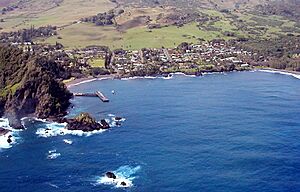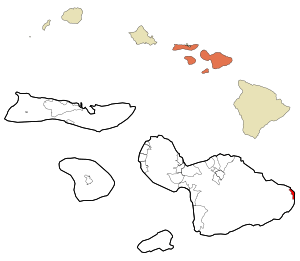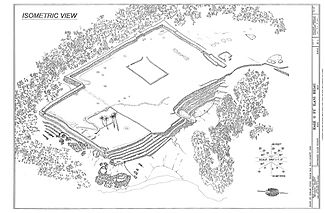Hana, Hawaii facts for kids
Quick facts for kids
Hana, Hawaii
Hāna
|
|
|---|---|

Aerial view of Hana, Maui
|
|

Location in Maui County and the state of Hawaii
|
|
| Country | United States |
| State | Hawaii |
| County | Maui |
| Area | |
| • Total | 11.70 sq mi (30.30 km2) |
| • Land | 10.56 sq mi (27.34 km2) |
| • Water | 1.14 sq mi (2.96 km2) |
| Elevation | 128 ft (39 m) |
| Population
(2020)
|
|
| • Total | 1,526 |
| • Density | 144.53/sq mi (55.81/km2) |
| Time zone | UTC-10 (Hawaii-Aleutian) |
| ZIP code |
96713
|
| Area code(s) | 808 |
| FIPS code | 15-11350 |
| GNIS feature ID | 0359013 |
Hana (Hawaiian: Hāna) is a census-designated place (CDP) in Maui County, Hawaii, United States. The population was 1,526 at the 2020 census. Hana is located at the eastern end of the island of Maui and is one of the most isolated communities in the state. It is reached mainly via the Hana Highway, a long, winding, 52-mile-long (84 km) highway along Maui's northern shore, via boat, and with commercial air service to Hana Airport.
Contents
History
Like most of Hawaii, Hana was probably first settled between 500 and 800 AD by Polynesian peoples.
The first sugarcane plantation in the area was established by George Wilfong in 1849, and by 1883 there were six plantations operating in the area. By 1946, however, the last sugarcane plantation had closed, leading plantation workers to move mostly to the west side of Maui. That same year saw the opening of the Kaʻuiki Inn, later known as the Hotel Travaasa – Hana and today as the Hyatt Hana-Maui Resort, which helped transition the economy towards tourism.
The winding, famously scenic Hana Highway was completed in 1926. Originally paved with gravel, it provided the first land vehicle access to the town. Hana's population peaked in the first half of the twentieth century, with a population of about 3,500.
Geography and climate
Hana is located at 20°46′12″N 155°59′39″W / 20.77000°N 155.99417°W (20.770017, −155.994179), directly on the East rift zone of East Maui Volcano (Haleakalā). The Hana Airport offers flights with regular service to the Big Island, Kahului, and Oʻahu.
According to the United States Census Bureau, this CDP has a total area of 11.7 square miles (30.3 km2), of which 10.5 square miles (27.3 km2) is land and 1.2 square miles (3.0 km2), 9.77%, is water.
Near Hana are natural areas and several swimming holes in the Haleakalā National Park.
Hana's climate is hot and wet year round, typical of a tropical rainforest.
| Climate data for Hana Airport 355, HI US (1991–2020 normals, extremes 1950–present) | |||||||||||||
|---|---|---|---|---|---|---|---|---|---|---|---|---|---|
| Month | Jan | Feb | Mar | Apr | May | Jun | Jul | Aug | Sep | Oct | Nov | Dec | Year |
| Record high °F (°C) | 91 (33) |
88 (31) |
88 (31) |
88 (31) |
89 (32) |
89 (32) |
90 (32) |
89 (32) |
91 (33) |
91 (33) |
94 (34) |
89 (32) |
94 (34) |
| Mean daily maximum °F (°C) | 77.8 (25.4) |
77.3 (25.2) |
77.5 (25.3) |
78.2 (25.7) |
79.7 (26.5) |
81.1 (27.3) |
81.7 (27.6) |
82.9 (28.3) |
82.5 (28.1) |
81.9 (27.7) |
80.2 (26.8) |
78.8 (26.0) |
80.0 (26.7) |
| Daily mean °F (°C) | 71.3 (21.8) |
71.1 (21.7) |
71.6 (22.0) |
72.8 (22.7) |
74.1 (23.4) |
75.5 (24.2) |
76.4 (24.7) |
77.3 (25.2) |
76.4 (24.7) |
76.2 (24.6) |
75.0 (23.9) |
73.4 (23.0) |
74.3 (23.5) |
| Mean daily minimum °F (°C) | 64.8 (18.2) |
65.0 (18.3) |
65.7 (18.7) |
67.4 (19.7) |
68.4 (20.2) |
69.8 (21.0) |
71.2 (21.8) |
71.7 (22.1) |
70.3 (21.3) |
70.5 (21.4) |
69.8 (21.0) |
68.0 (20.0) |
68.5 (20.3) |
| Record low °F (°C) | 50 (10) |
50 (10) |
52 (11) |
52 (11) |
56 (13) |
59 (15) |
56 (13) |
59 (15) |
59 (15) |
58 (14) |
54 (12) |
53 (12) |
50 (10) |
| Average rainfall inches (mm) | 5.64 (143) |
5.48 (139) |
8.46 (215) |
5.00 (127) |
5.43 (138) |
4.45 (113) |
5.49 (139) |
5.99 (152) |
6.12 (155) |
6.88 (175) |
6.65 (169) |
6.59 (167) |
72.15 (1,833) |
| Source: NOAA | |||||||||||||
Demographics
| Historical population | |||
|---|---|---|---|
| Census | Pop. | %± | |
| 2020 | 1,526 | — | |
| U.S. Decennial Census | |||
As of the census of 2010, Hana had 1,235 residents, 390 households, and 252 families residing in the CDP. The 2010 population density was 105.6 people per square mile (40.8 people per square kilometer). There were 506 housing units at an average density of 48.2/sq mi. The racial makeup of the CDP was 22.2% White, 0.1% African American, 0.1% American Indian and Alaska Native, 5.0% Asian, 29.1% Pacific Islander, 0.8% from some other race, and 42.8% from two or more races. Hispanic or Latino of any race were 9.8% of the population.
As of 2010, there were 390 households, out of which 23.8% had children under the age of 18 living with them, 45.6% were headed by married couples living together, 9.7% had a female householder with no husband present, and 35.4% were non-families. 29.5% of all households were made up of individuals, and 9.7% were someone living alone who was 65 years of age or older. The average household size was 3.17, and the average family size was 3.99.
As of 2010, in the CDP the population was spread out, with 27.8% under the age of 18, 8.5% from 18 to 24, 24.3% from 25 to 44, 25.7% from 45 to 64, and 13.5% who were 65 years of age or older. The median age was 35.2 years. For every 100 females, there were 105.5 males. For every 100 females age 18 and over, there were 111.9 males.
As of 2000, the median income for a household in the CDP was $50,833, and the median income for a family was $54,167. Males had a median income of $26,146 versus $22,969 for females. The per capita income for the CDP was $14,672. About 5.6% of families and 8.6% of the population were below the poverty line, including 10.4% of those under age 18 and 3.8% of those age 65 or over.
Points of interest
- Fagan's Cross
- Pi'i-lani Temple – constructed in the 15th century, this is the largest temple in Hawaii
- Kahanu Garden
- Kaia Ranch Tropical Botanical Gardens
- Hana Beach Park
- Hana Ball Park
- Pailoa Bay
- Hamoa Beach
- Waiʻanapanapa State Park
- Hasegawa General Store
Economy
Major employers in Hana include the Hana Maui hotel, Hana High and Elementary School, and Waiʻanapanapa State Park.
Notable residents
- William Kwai-sun Chow, was raised here
- Queen Kaʻahumanu, born in Hana in 1768
- Charles Lindbergh, retired there in the 1970s and was buried near Hana in 1974
- Pat Benatar, married to Neil Giraldo in Hana in 1982, has houses in Hana and in California.
- George Harrison and his wife Olivia Harrison had a property in Hana. Harrison wrote the song Soft-Hearted Hana about time spent in Hawaii.
- Kris Kristofferson lived and died in Hana.
- Frank Herbert, the science fiction author, moved to Hana in 1980, toward the end of his life.
- Jim "Kimo" West, part-time resident
- "Weird Al" Yankovic, part-time resident
- Richard Pryor, Renowned comedian/ Actor. Announced he was moving to Hana, Hawaii on the Tonight Show with Johnny Carson on September 5th, 1980. His cremated remains were scattered in Hana, bay, in 2017 by his widow.
Gallery
See also
 In Spanish: Hana (Hawái) para niños
In Spanish: Hana (Hawái) para niños








